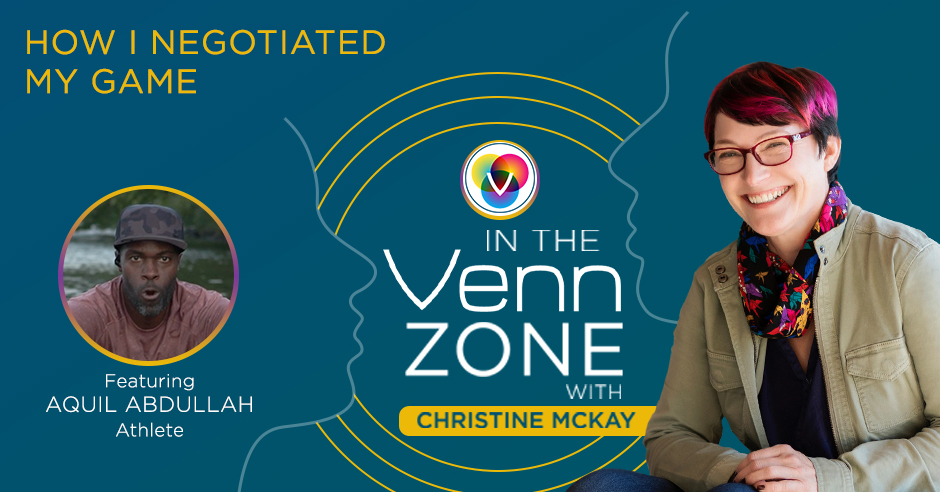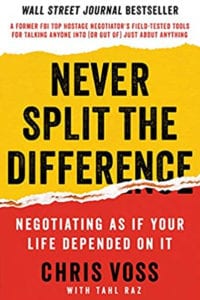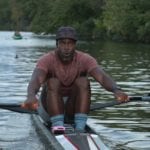
Negotiations happen everywhere, the sports industry included. Athletes live and breathe negotiation, from getting that scholarship, bagging a sports contract, to being drafted into their dream teams. Join Christine McKay as she interviews Aquil Abdullah, the first African-American male to qualify for the Summer Olympics in the sport of rowing. Aquil is currently the Senior Infrastructure Engineer as well as a featured athlete at Hydrow, Inc. He walks us through some of the lessons he learned while training for the Olympic team and the things that he negotiated with his coach to continue doing what he needed to do. Hear him talk about the negotiation experiences that shaped his life and led him to where he is in his life right now.
—
Watch the episode here
Listen to the podcast here
How I Negotiated My Game With Aquil Abdullah
Welcome back to another episode where we help you, the small business owner, level the playing field in near negotiation. We do that by bringing you amazing guests who have very interesting and sometimes unusual backgrounds but always have fabulous stories to help you learn about different ways to negotiate every day in your business. As we often say, if you’ve read before, you know and if you haven’t read before then you’ll know it for the first time. “Negotiation is nothing more than a conversation about a relationship and you cannot win in a relationship.” Our guest may have a slightly different view on some aspects of that quote because he is an actual Olympic athlete. Indeed, he rode in the 2004 Athens Olympic games and he’s been a friend for a long time.
He is an amazing guy. He graduated from George Washington University a few years ago with a degree in Physics but he now works for one cool company that is airing it up now. He works for Hydrow, the company that does in-home rowing machines, which I have and love. He started there as a featured athlete but is now their senior infrastructure engineer. He is out of Boston, Massachusetts lives with his wife and his two adorable kids in Ipswich, North of Boston. I am so excited to have him here to talk about negotiation, trying to think a little bit different way. We’re going to talk about some of the lessons. He has some cool stories about when he was training for the Olympic team and was on the US national team, things that he negotiated with his coach. We’ll bring that all back into the business and all that good stuff. Aquil, I’m so glad to have you here. Thank you for joining me.
Thank you for having me. I’m excited to be here to see if I can up my negotiation game.
Tell us a little bit more about your background and how you’ve ended up where you’re at now.
I started in Washington DC as a little zygote ever since I got the zygote day. I grew up in Washington DC. I went to high school there and I went to George Washington University there. Basically, as related to my sports life, my first negotiation was with my mother. I was headed out the door for senior beach week, which is where high school seniors go to the beach for the week. I hadn’t yet committed to where I was going to go to college whether I was going to play football or whether I was going to row. She’s standing at the bottom of the stairs and she’s like, “You’re not leaving the house until you decide where you’re going to school next year.”
Maybe this isn’t a negotiation but I knew that there was a bunch of beer in the trunk of the car that I didn’t want her to see. I said, “I’m going to row.” Maybe that’s her negotiating with me. I don’t know how that works. I decided to row in college and that was set me on a trajectory. Little did I know that would be my ticket to the Olympic games. I enjoyed sports and science and that where my head was. That’s my story. After the Olympics, I moved to Boston where I met you and a bunch of other friends who would soon become my new tribe. I worked for a little startup there and we were acquired by Microsoft. Big companies that weren’t my bag.

I liked small companies where you’ve can feel as though you make an impact. I left there and I went to a company called CargoMetrics, more engineering there. It’s funny. I have done very little physics since college. One day, I got a call from a guy Bruce Smith that I knew from community rowing here in Boston. He was like, “You want to meet up for lunch? I’ve got this idea that we’re starting out the rowing machine and all of this.” I was like, “That sounds cool. I’ll come and check it out.” At the time, we had our second child and I couldn’t wrap my mind around the whole thing because I was coming from the perspective of being an elite rower, not understanding how we expand rowing to the masses.
Hydrow was persistent and a year later we brought up a conversation again and I started rowing there one day a week. I come down one day a week, shoot an episode one day a week, one workout a week. By the fall, this company is going places and doing some incredible things. I love the message of community that they’re bringing and the relationships that they’re helping to build. I wanted to be a part of that.
I got my Hydrow a little while ago and I love it. You didn’t know that my husband was a rower and he rode for North Eastern. He’s like, “Can you ask Aquil to make sure that I can shut everybody off beyond a row?” I love it. He taught me how to row a few years ago on a machine, obviously on an Erg and I fell in love. It’s such a great workout and it’s such amazing. For any of our readers who haven’t checked out Hydrow, go to Hydrow.com. People ask me, “Peleton or Hydrow?” I’m like, “Get the Hydrow first and then if you still feel you need a Peloton then get the Peloton but do the Hydrow first. It’s an awesome piece of equipment and you kick everybody’s butts.”
All of the instructors are phenomenal. It’s good. I need to get more into the community side of it but I’m still feeling my way through it. Let’s talk a little bit and going back into that time when you were training and you told me what I thought was a crazy story. I know two Olympic athletes now that I think about it. I know somebody who won the gold medal in women’s soccer in Atlanta. I have a picture of me wearing her gold medal. Her name is Mary Harvey. I should try to get her on the show.
She was also the first woman who was a Director for FIFA. She’s all that. She’s pretty awesome. I think about Olympic athletes and all I think is you guys eat, sleep, drink, everything is all about the sport. You made some interesting plays with your coach. One of the things I didn’t share when I read your bio is, Aquil is an accomplished saxophonist. You told me this awesome story about how you negotiated with a coach so that you could stop practicing for a month and go play sax professionally. Tell us more about that because I thought that was such a great story.
You have to know what your value in any negotiation, no matter what it is that you're negotiating. Share on XI’ve played the saxophone ever since junior high school. I had played around when I was training in Princeton, New Jersey, I connected with this group of guys in Philadelphia and it so happened that they were opening up for G. Love & Special Sauce. Garrett said, “Can you guys be one of the opening acts?” That was a rare opportunity. I still wanted to go to the Olympics. One of the dynamics that you have in any negotiation is a relationship. A lot of times as an athlete, your coach has the power that you grant them over your life especially in places where you are selected.
You’re taking a risk if you deviate from what is the norm. I knew that I wanted to do this. I knew that I wanted to keep training. I went to my coach and I had no idea how the conversation was going to turn out but it turned out better than I expected. He was like, “This is your life. These are your dreams, do what you feel like you need to do. If you come back and you’re still competitive then you keep training. If not then maybe you’re off to go play music, who knows?” There was a risk that was there for me. I didn’t know if I wanted to take that risk. In the end, I decided, “I can try. I’ve got a long athletic career ahead of me and this is the time for me to take that risk.” The thing that stuck out to me from that meeting gave me the confidence to have hard conversations with people who I deemed as having authority or decision-making abilities that directly affected me.
There’s so much in that. One of the things that I talk about a lot is what I affectionately called David and Goliath negotiation. I do a lot of work with smaller companies that are negotiating with major corporations and I look for ways to help them level the playing field. You said a whole lot of things in there. I also talk about the hardest part of any negotiation is a negotiation we have between our ears. You had to have that negotiation, “Was this the right time? Could you continue to pursue the dream of going to the Olympics and competing and rowing while pursuing this cool thing to play the play saxophone?” There is that element. The notion of power in a negotiation is massive.
It turns out that my consulting clients are almost exclusively minority or women-owned businesses. I suppose it goes to stand because I’m all about leveling the playing field that I do a lot more work, giving people a voice that doesn’t necessarily feel that they have a voice of their own. What were some of the things that you did in that discussion to prepare yourself for that discussion? You said you weren’t sure how it was going to play out but if you can think back to that time, what were some of the things that you told yourself that you did to prepare yourself for what might happen? The coach could have easily said, “You go do that and you’re off the team because there are 100 people standing in line waiting for somebody to fail so that they can take their place.” How did you manage that dynamic in your head?
There was a lot going on. One was that I spoke to other people. I spoke to my mother who is one of my great counselors. I spoke to some other athletes. What I said to myself is that, “Is there any way that I come back to rowing and it doesn’t quite look like what it looks like now but it’s still something that I could live with?” Maybe it was that I come back, I’m off my game. I don’t make the national team this year but I’m still on a trajectory to go to the Olympics, “Is that something that I can live with? Is that an outcome that I can live with?” Going back, I thought about some of the outcomes.
Even saying, going to my coach does that now in his eyes, make him think that I’m less committed to this endeavor, to which people are basically turning down every other option in their life. I was lucky because we had a coach who didn’t. He once said to us, “I don’t want to be anyone’s everything. If I have to cut a guy, I want them to have other things that he can do so that this experience when it ends, it’s only rowing.” Part of me going into this discussion, this negotiation was also knowing who I was having been negotiation with. That’s a big part of it when you’re going in blind, you have a lot of guesswork that you have to do.

The conversations that I had in my head were around making sure that I was prepared for the possible outcomes and the most consequential of which was me being perceived as less committed because then that affects other decisions that are made by your coaches. I talked to other people, I tried to make sure that my relationship with my coach was one in which I could feel empowered even though in some ways I felt powerless. That’s the stuff that’s up in your head and that’s how I went about it.
This is good because this feeds into a lot of the things that we’ve talked about on the show before and when I do training programs and that I practice when I’m negotiating. One of the things that people often do not do very well. I spoke at an event one time and the host of the event after she heard me speak, she’s like, “I wasn’t sure how the topic of negotiation was going to play out but I learned a lot. I have learned for the first time about my counterpart.” For me, I’m like, “What?” That’s so far that would be something that somebody who’s later in her career would go, “I have to think about my counterpart.” That’s exactly what you did.
You’re like, “How do I think about my coach? How do I think about how he’s going to respond? What are the potential options? What does that all mean? How does my relationship come into play?” You have another story from when you were on the Olympic team where you negotiated to change your training up because you were rowing in the winter and it is ironic to a certain extent that you’re great. This story I’m using because of the company that Aquil works for in doing in-home rowing machines but you negotiated to change up your training routine to go train at Lake Placid with the cross-country ski team one year. Tell us how that works because that also had to come into play. It’s a very different type of training. Intuitively, there would be a lot of benefits to that. How did you position that? Was that before or after?
That might’ve been before this negotiation was it a bit different and I was oddly enough burned out of rowing on the rowing machine. It wasn’t a Hydrow to be fair.
It was a concept, too. I’m sure they’re not very good at Hydrow.
Negotiation is communication, but not every communication is a negotiation. Share on XI didn’t feel like I was making much progress. I was talking to my coach and it was like, “I’m not performing at the level I want to be performing at.” It turned out it was the canoe kayaking teams that I went to training and they were training in Lake Placid. In the winter, they cross-country ski. I didn’t know if that cross-country skiing was going to be the outcome of this conversation but once again, I had to empower myself to be able to have a conversation with my coach to say that, “This isn’t working for me.” “In a situation where all the other athletes are doing it, why isn’t it working for you? You can go train with the canoe kayaking team and go cross-country skiing and lift weights.”
Since all I would be doing for the winter anyway was lifting weights and rowing on the Erg. There’s not a whole lot of difference there. For me, there were a number of instances in my career that I didn’t view as negotiations but in essence, they were and there was risk involved in them. I had to be able to understand the risks. It’s hard because that’s the right brain side of me that if I can’t understand all of the risks, I have a hard time. I know that I don’t understand all of the risks but if I don’t understand what is a sufficient amount, I have a hard time moving. I have a hard time making that leap. In both of these cases, I felt like I had sufficient enough information to warrant, like taking the risk. For this particular case, I went in. This is a good story because when I was in college, the same coach, he’ll never admit this but he said to me, “You will never make the national team. You’re too small,” and I did.
I know that small is not a word that the average person would use to define Aquil. I’m throwing that out there.
It was funny because here I am talking to this guy who is now the coach and has a lot of control over my destiny. I went through that whole process and the outcome was far better than I could have expected. I came back, I pulled some of my best scores ever. It was that change, “Help me to reboot at a time when I felt like I needed it.”
The process that you naturally went through is that you got clear on what it is that you wanted, you figured out a way to ask for it and then you deliver it against the results that you committed to, that there was a commitment on your end. You knew what your coach needed in order for you to continue to move forward training with the team and you delivered that. When I do training, I talk about the importance of getting clear on, “What it is that you want, why it’s important to you, understanding what your counterpart needs, knowing how to ask in a way that’s intentional and then making sure that everybody lives up to what they said that they were going to do.” That essentially right there, that’s the whole negotiation process.
You did that regularly. It’s interesting because you said a couple of things in terms of getting comfortable. One thing that you said was getting coming comfortable, asking hard questions. When we’re in relationships and you and I are both married. My husband and I have been married for coming up on 30 years almost now and I’m still head over heels in love with the man. It’s adorable. It makes my kids get up. Sometimes we can tell ourselves that having a hard conversation is going to hurt the relationship. When what hurts the relationship is avoiding the hard conversation because a great relationship isn’t about avoiding conflict.

It’s about dealing with conflict constructively. One of the things that you did in your training experience was doing that, taking a situation where you felt you were you didn’t necessarily have any power. You did have some power and you did have some leverage. Otherwise, the outcome would have been different but you figured out what that looked like and you used it judiciously. You figured out what your alternatives could be and could you live with those outcomes. You have this kind of natural inclination for how you did that. Now, how has that translated for you into your professional world?
All of this has been interesting. I’m going to name drop someone else in this negotiation around Chris Voss. He used to live near my parents down in DC. When I had finished my rowing career, I had to make a decision about what I was going to do next. I had the option of going to work in Philadelphia, in finance or coming up to Massachusetts to work in the scientific tech startup space. There were two deals that were on the table for me and I had to try to figure out, which one was right for me. Now, as good as I feel like I was negotiating and advocating for myself when it came to sports, I was totally and didn’t know the business world as much.
I didn’t have the knowledge of my counterpart, the way that I did with the sport. I was counseled by Chris on trust, knowing my value and knowing what it is that I wanted to get out of it. Those are all things, all skills that I had from negotiation in terms of sport. The difference was that I didn’t know the counter side of that as well. I knew the people that I interviewed with, I knew the businesses. The other side of that is like, “I wasn’t sure of my value.” If you asked me to sit down and row, I’m like, “I know that value. I had that confidence in my value but when it came to business, I now had to try to translate that into knowing my value in this other sphere.” It’s one of those situations where people talk a lot about, “There are all of these great lessons that you get from the sport.” They’re there but how do they then translate to the next phase of your life? It’s easy to miss the ability to translate that if you don’t have someone, I think sometimes to walk you through that.
I’m going to ask you. Our readers know because not everyone knows Chris. Chris Voss is the author of Never Split the Difference. He is a retired FBI hostage negotiator, not just any FBI hostage, negotiator, he was the Head of the FBI’s negotiation team. His book, Never Split the Difference, I highly recommended, excellent book, lots of good things in there. Chris, if you read this, I want to meet you. He and I would have a great conversation. We both have things we could learn from each other. In addition to Chris and having the world’s leading FBI hostage negotiator telling you about that. How did you define telling you to go figure out what your value is? How did you figure that out? What are the things that you did in addition to talking to Chris?
Me knowing my value, no one can give you that. It was thinking about more of, for me, what it is that I wanted and the work that I was willing to do. I could go to the world of finance and say, “I studied physics, I know math but that’s what I bring. I have hard work. I know I work hard. Coming up here, I know physics, I know that this platform that you’re building is about math and physics and I can guarantee you that I can give you that hard work.” The value that I had to find in myself was that there were a lot of things that I didn’t know at the negotiation table, these respective opportunities. What I did know was that I could work hard and I would work tooth and nail to deliver what it is that I agreed to deliver.
Mentorship is one of the most important things in life. Share on XKnowing that ability of myself gave me the ability to walk in and say, “What is my value?” Also, knowing what the value is out there. As an employer, you can look at things in a couple of ways, you can say, “What is the market value for this position? What is the experience that this person brings to the table?” You then can make decisions about that. You say like, “This is what we’re willing to pay the person for this job. You can value that position.” As a prospective employee, I had to say, “This is what I know the market looks like and this is what my value is and what I need to be able to thrive in this environment.” Once I had that in place, even though I still didn’t have the knowledge of who was on the other side of the table, I had enough knowledge to make that decision.
Some of the audience know I actually was very blessed and fortunate to have attended Harvard University to get my MBA. A few years after I graduated, I did career advising work at HBS as we call Harvard Business School. I remember this one student, he was an engineer. He had worked for Schlumberger on an oil platform in the Middle East and that’s what he did. That was all he knew. He wanted to go work in the pharmaceutical industry. He had a challenging demeanor about him. He was very gruff and it was hard for a lot of people. He went through a lot of career coaches and couldn’t figure out how to help him.
I’ve put a negotiation hat on and he’s like, “I’m being told that nothing in my background matches. There’s nothing that working on an oil platform in the Middle East, doesn’t get me closer to pharmaceuticals,” and I will never forget this. I said, “That makes no sense to me because they use petroleum products to manufacture pharmaceuticals so we can make a case. We can figure out what that storyline is,” and that’s exactly what we did. Not only did he landed an amazing job at Eli Lilly in France. It was awesome but we created that storyline. What is that common ground and how do you figure? We created, what does his value look like as a result of working in, what did that do for him? I’ll never forget that story. I gave myself goosebumps, just remembering that story.
“I want to go into chicken farming, go.”
There you go. “Physics, how are chickens going to poop and it falls on the ground?” That’s the thing that I love about negotiating, like good negotiators. Speaking of chickens, I often have a raw egg that I hold and I’m like, “You have three people who want this one egg and that’s it.” You’ve got one egg. How do you get it amongst three people? Almost everybody says, “You boil it and you cut it up or you scramble it and split it up or make an omelet and split it up.” I’m like, “You could just take a pin and poke a hole in the bottom of the egg, drain the yolk and separate the yolk from the white and you have three separate parts of the egg of equal value.”
If it’s fertilizable if it’s an egg that you could also incubate, touch the darn thing and make more eggs. There’s the thing about negotiation is that it’s all about possibilities when you’re looking at a job or you looking to get a new customer or a new supplier or an investor. In Hydrow, you guys have done a number of investment rounds, I believe. Whenever you’re looking for new investors, what’s that story? What’s that thread that is true, real and consistent with who you are, that message of who you are that you can bring to that table because that stuff matters in every negotiation?

No matter what anyone says, you’re never negotiating with a company. It doesn’t matter if you’re negotiating a $10,000 deal or the largest deal I’ve ever done is $2.4 billion. The process of negotiating a $10,000 deal or your job is the same as negotiating a $2.4 billion transaction. It’s the same. What you’ve highlighted is essential that figuring out that value, you have to know that your value in any negotiation, no matter what it is that you’re negotiating whether it’s your job or something else, doesn’t matter.
It’s crazy because that is something that I intuitively knew in sport but I didn’t know in business but it was only because I had never asked myself that question before. I’d never had to make that decision. That is something that you’re constantly gaining knowledge. You’re constantly gaining new experience. It’s something that people should think about.
One way of thinking about it is every negotiation is communication. Not every communication is negotiation but every negotiation is communication. At least for me and our philosophy at Venn Negotiation is that it is about a relationship. You can’t win in a relationship. I forgot to ask you the story about the 0.03-second miss. When you’re part of a team and somebody is sick or somebody is having a struggle of a day and how you lift each other up is how the whole boat goes. I imagine, like in any team activity I’ve been, if you’re lifting each other up and when you’re negotiating in business, you’re in a negotiation because you think you’re better off as a result of doing the negotiation. If that’s the case and you both feel that way then it’s a way to lift each other up. Tell us a little bit about the story of you missing.
That’s a dark place. I was on track to make it to the 2000 Olympics. Everything was looking like it was firing on all cylinders. I basically had to go to a race. I had been beating people all year who were competing then probably a month out, a guy got cut from the team who was pretty good but he didn’t get cut. He made the decision that what was happening wasn’t working and he decided to row in the single. We had Olympic trials and we had our first race that I won. We had the second race, I have asthma so I had an asthma attack and he won that one.
We went to runoff and I lost by 3,300 of a second. It’s crazy to think about every time I breathe, I’m like, “I could’ve been at 2000 Olympics on the other side of that.” It was a hard hit because there’s a lot of hype. I felt like I let people down, this was supposed to be my moment. I had to negotiate my way out of that hole that I was in after that. That’s a conversation you have in your head. “Why am I doing this? Should I continue? Should I go on? Woe is me.” The whole thing was pretty wild but definitely something that this has been my coach, oddly enough. I was standing down at the dock, my mother and everything was down there. He said, “Look down the dock, your parents still love you.” I was like, “I didn’t want to hear it,” but it’s true. We create these narratives in our heads about what the expected outcome should be and that limits our ability to see what the expected outcome could be.

One of the guests that were on the show and I’m doing some collaboration with them as a gentleman named Blair Dunkley. He does a lot of work and has for a number of decades now on Mind Models. He talks about one of the things that hang us up is that we should be looking or not should, he would go, “Don’t say should.” One way of changing the narrative that we have is to look for things that are externally verifiable. Your coach was essentially saying to you to look for the external verifiable things to determine your value and your worth versus the internally verifiable things.
This goes back to the job situation too because, at the end of the day, our brains will always tell us that, “We’re not worthy, we shouldn’t try, we shouldn’t try to do more and that we should sit and be content where we’re at.” That’s our brain doing what it’s supposed to do, which is protect us, keep us breathing, alive and safe. One of my favorite quotes was when I was training in martial arts and one of my martial arts instructors used to say that, “As human beings, we’re screwed because we’re comprised mostly of water and electricity and electricity seeks the path of least resistance and water seeks its lowest level.” When we let that talk in our head, that internal component determines who we present ourselves and who we are externally, instead of relying on externally verifiable information to reinforce who we are, that’s a significant part of what draws us down. It causes us not to ask for more of what we want and expect more from ourselves and from others around us.
I’ve got a question for you that sounds amazing. What if you are in a situation where you don’t see the externally verifiable things? Let’s say you’re in an abusive situation. I’m working on diversity, equity and inclusion in rowing. We have kids that come from a traumatic experience. If you are trying to see externally verifiable things and there are major influences not giving you that ability to value, how do you deal with that?
From my own experience, I don’t know if you know this about me. I was an unwed teen mom. I was living in the back of my car, homeless. I was on welfare for almost ten years in an abusive marriage and decided I wanted a different life for myself. I negotiated one. I went through some of the things that you’re talking about, a completely whitewashed experience in terms of the fact that I’m white. That definitely that privilege existed. To the best of my knowledge, nobody’s ever gone from being homeless, having three kids and graduating from a Harvard MBA after being on welfare for almost a decade.
I don’t think anyone’s done it, nobody did it before me and nobody’s done it since. The biggest thing is doing what you’re doing is surrounding yourself with people who believe in you more than you do at the moment that’s necessary. You are that person for these kids. When I look back and people ask me, “How did you get out of that situation?” That’s what I say, “I happened along with people.” It wasn’t like I went out looking for them. They found me and they believed in me more than I believed in myself at that moment. They lifted me up and helped me see something in myself, not right away but that reinforcement, that mattered. It was cumulative.
The more people I had in my world who told me that I was good at something and that I was worth something, the more value I saw in myself. Mentorship is one of the most important things in the world to me. I can point to certain people who changed my life simply by a sentence that they said to me. To me, the kids that you’re working with and the work that you’re doing is amazing. We need so much more diversity in every aspect of the world and certainly in rowing but everything. What you’re doing, it is it. You are fulfilling that role for these kids in these traumatic situations and that matters. That’s where we start helping people ask for more.

In California, one of the things that I do love about living here is like in job situations, it’s no longer legal in California for an employer to ask you what your past salary was. That should be a national law. In my opinion, that should never come into play on what a company sees as the value of the work of that role. As I’ve gotten older and progressed in my career, for me, it’s about being that person like you are. I’ve worked in a couple of nonprofits where we do mentorship and mentoring young adults as well as mentor single moms.
That is part of where that starts is reinforcing to everybody. Somebody told me there’s a 1 in 14 trillion chance that you and I, where who we are at this moment in time. Every person is truly unique and worthy of doing amazing and great things. I was talking to somebody before, they did a study in Asia. It was either in Korea or Japan. They had a bunch of women come in and take a math test. Fifteen minutes before they took the math test, these women were told, “Your women aren’t good at math,” all those stereotypes.
Three minutes later, the same group came in and they were told, “Asians are statistically better at math,” 30% higher scores. To the Mind Model thing, it is that making sure and this is to the audience if you believe in lifting people up, be that mentor, be that advocate for people. At the end of the day, that changing our mentality around how we communicate with each other, in my opinion, is going to change the world. This has been great and I enjoyed having you on, how can people find you?
I’m under witness protection. You can find me on Instagram, @Aquil_Hydrow. I have a Facebook page as well. That’s where I’m working on rolling out a website. That’s being an engineer on Lowe’s to pay anyone to do it and my copious amount of free time I work on. I have lots of other stuff out there on the web from conversations mostly about rowing and about diversity equity and inclusion. Look me up, do a quick search and you’ll find me rambling about all types of things.
Check out the Hydrow. It’s an amazing piece of equipment to have in your home. It gives you a great workout and look to follow Aquil. He’s such a great guy. I appreciate this conversation. I hope that you’ve enjoyed being on the show and learn some things along the way too. I’ve learned a lot. Thank you very much for sharing and to all of our audience, thank you so much for tuning in. I can’t wait to see you next time on the show, where we work to help you, the small business owner, level the playing field and elevate your negotiations. Ask for more of what you want and expect to get it. We’ll see you next time. Have a great day, everyone. Cheers.
Important Links:
- Never Split the Difference
- @Aquil_Hydrow – Instagram
- Facebook – Aquil Abdullah
- www.Hydrow.com
About Aquil Abdullah
 Aquil Abdullah rowed at The George Washington University where he graduated in 1996 with a degree in Physics. He was on the US national team from 1999 through 2004. He competed at the 2001 and 2002 World Championships and the 2004 Athens Olympic Games.
Aquil Abdullah rowed at The George Washington University where he graduated in 1996 with a degree in Physics. He was on the US national team from 1999 through 2004. He competed at the 2001 and 2002 World Championships and the 2004 Athens Olympic Games.
Currently, Aquil is the Senior Infrastructure Engineer as well as a featured athlete at Hydrow, Inc., Aquil was formerly a senior data analyst/software developer for CargoMetrics (Boston), a software developer for Microsoft and an application engineer for Interactive Supercomputing.
He earned a silver medal in the single at the 1999 Pan Am Games and was the first African American male rower to qualify for the Summer Olympics (2004) where he made the final in the men’s double, the only US men’s double to have done so since 1984. Aquil also won the Diamond Challenge Sculls (1x) at the Henley Royal Regatta in 2000.
Aquil coached the Mandela Crew which was the first African American and Latino crew to compete at the Head of the Charles from 1998-1999. Aquil also had a feature role in the 2004 documentary Unconstitutional which addressed restrictions on civil liberties that coincided with the passing of the Patriot Act. Aquil has been on numerous boards and advisory boards including Community Rowing Inc. (2009 – 2010), Chicago Training Center Athlete Advisory Council (2006 – 2012), RowVigor, Advisory Board (2017 – 2018), Blue Water Metrics, Technical Advisor (2016-present), and the Boston Foundation Civic Compact (2010).
Aquil and his wife Megan live in Ipswich, MA with their two children. Aquil can be seen rowing on the Charles River and on the Hydrow rowing platform. Aquil co-authored a book, Perfect Balance, after losing the Men’s Single Scull tie-breaker by 0.3 seconds at the 2000 Olympic trials. Aquil is also an accomplished saxophonist and has performed professionally.
